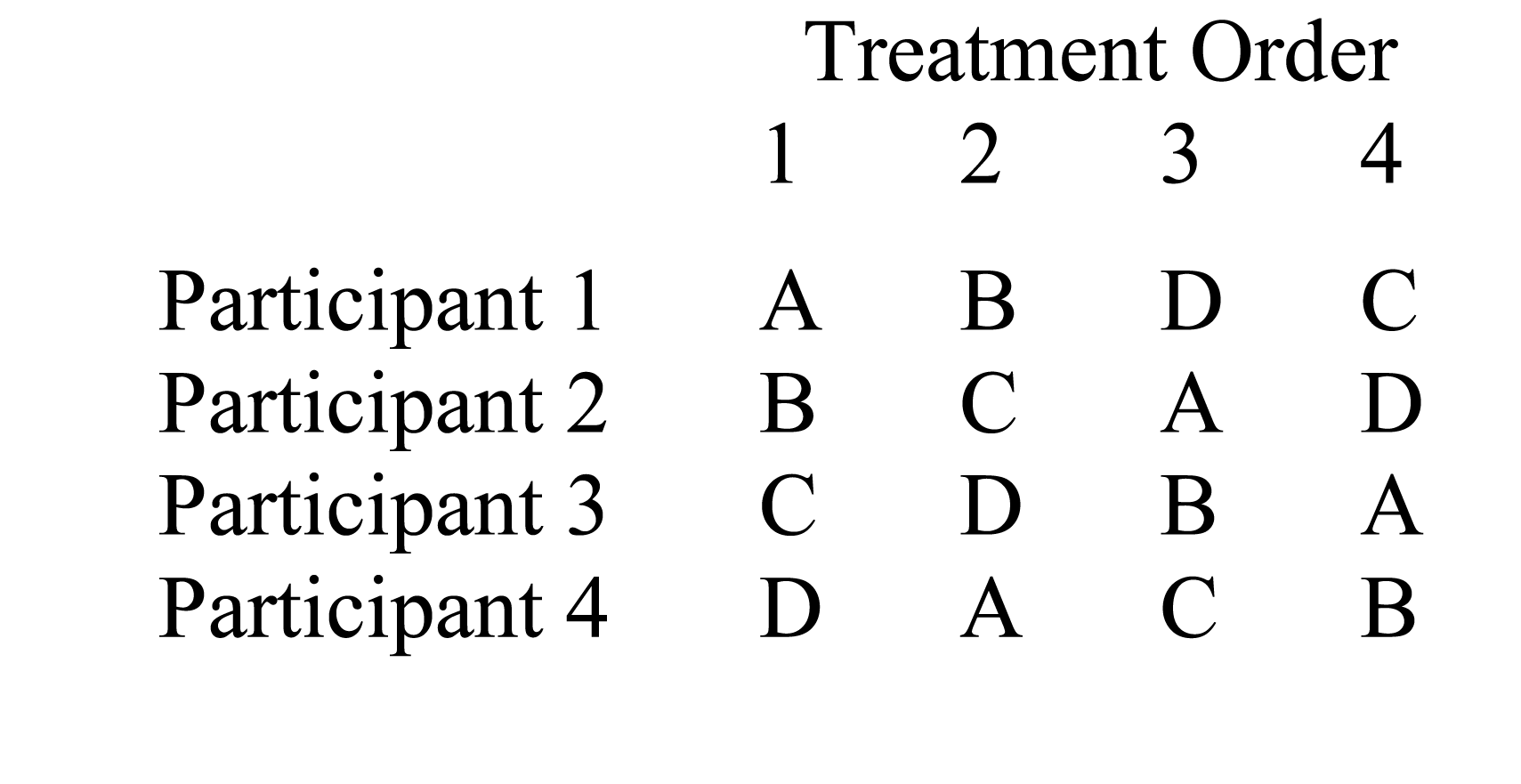It provides clarity on how to plan and implement adaptive designs for clinical studies used in medical device development. An adaptive design for a medical device clinical study is defined as a clinical study design that allows for prospectively planned modifications based on accumulating study data without. adaptive designs for medical device clinical studies.
Adaptive Designs For Medical Device Clinical Studies, The faster path to market. An adaptive design is defined as a design that allows modifications to the trial andor statistical procedures of the trial after its initiation without undermining its validity and integrity. SMi Groups Adaptive Designs in Clinical Trials Conference will return to London on 3rd and 4th April 2017 and will feature two case studies on Bayesian adaptive designs in medical device development.
 Blink Home Medical Device In 2021 Medical Device Design Devices Design Design Awards From pinterest.com
Blink Home Medical Device In 2021 Medical Device Design Devices Design Design Awards From pinterest.com
Reasons for Adaptive Designs in Medical Device Studies Sample size re-estimation Initial sample size based on highly uncertain effectiveness of device or control eg from feasibility or historical studies. Known as adaptive design the method can minimize clinical trial sponsors resource requirements and increase chances of study success. Evaluation of medical imaging devices often involves clinical studies where multiple readers MR read images of multiple cases MC for a clinical task which are often called MRMC studies.
The faster path to market.
Key study design components can be adapted throughout the trial. Evaluation of medical imaging devices often involves clinical studies where multiple readers MR read images of multiple cases MC for a clinical task which are often called MRMC studies. We develop adaptive MRMC design methodologies to enable study resizing. What makes a randomised clinical trial adaptive. Statistical analysis plans are needed for both interim and final analyses. Barnes PJ Pocock SJ Magnussen H et al.
Another Article :
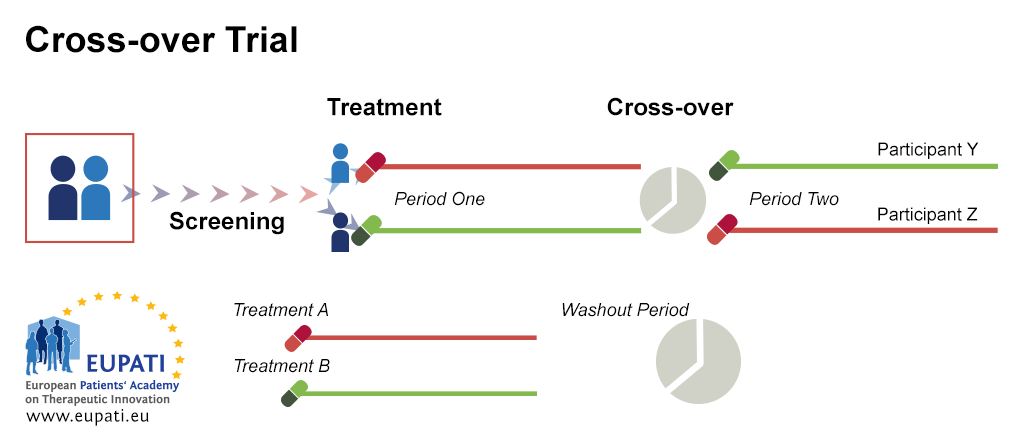
SMi Groups Adaptive Designs in Clinical Trials Conference will return to London on 3rd and 4th April 2017 and will feature two case studies on Bayesian adaptive designs in medical device development. Barnes PJ Pocock SJ Magnussen H et al. An adaptive design for a medical device clinical study is defined as a clinical study design that allows for prospectively planned modifications based on accumulating study data without. SMi Groups Adaptive Designs in Clinical Trials Conference will return to London on 3rd and 4th April 2017 and will feature two case studies on Bayesian adaptive designs in medical device development. What makes a randomised clinical trial adaptive. Clinical Trial Designs Eupati Toolbox.

Analytical results have been derived. Reasons for Adaptive Designs in Medical Device Studies Sample size re-estimation Initial sample size based on highly uncertain effectiveness of device or control eg from feasibility or historical studies. In essence adaptive designs allow prospectively planned modifications to a clinical trial based on interim data provided scientific validity the ability to draw sound inferences and data integrity credibility and reproducibility are preserved. Consequences and gains of possible trial adaptations need to be understood before initiation. The faster path to market. Pin On Farmacevtski Proizvodi.
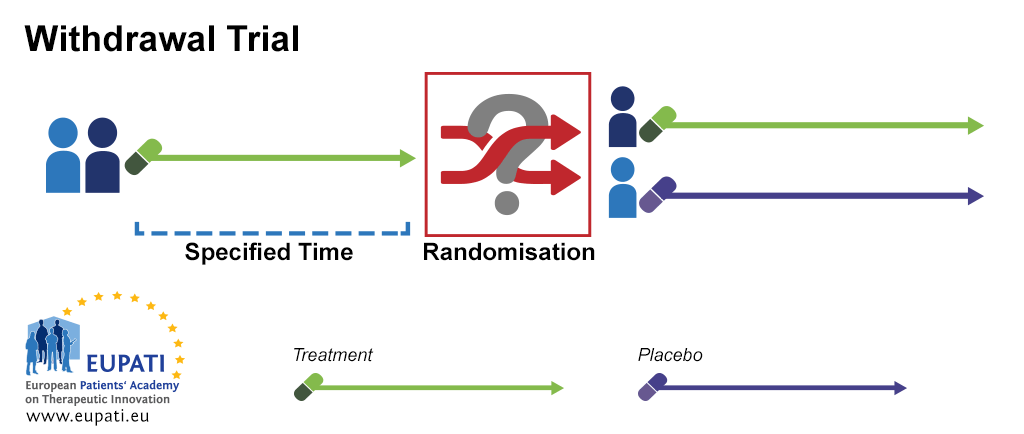
An adaptive design for a medical device clinical study is defined as a clinical trial design that allows for prospectively planned modifications based on accumulating study data without undermining the trials integrity and validity. The most frequently appearing type of adaptation was the seamless Phase IIIII design 81142 57 followed by adaptive group sequential 30142 21 biomarker adaptive 28142 20 adaptive dose-finding 23142 16 pick-the-winnerdrop-the-loser 13142 9 sample size re-estimation 11142 8 adaptive randomisation 10142 7 adaptive. The Food and Drug Administration FDA has started encouraging the use of adaptive designs for clinical studies. Evaluation of medical imaging devices often involves clinical studies where multiple readers MR read images of multiple cases MC for a clinical task which are often called MRMC studies. FDA Finalizes Guidance on Adaptive Designs for Device Studies. Clinical Trial Designs Eupati Toolbox.
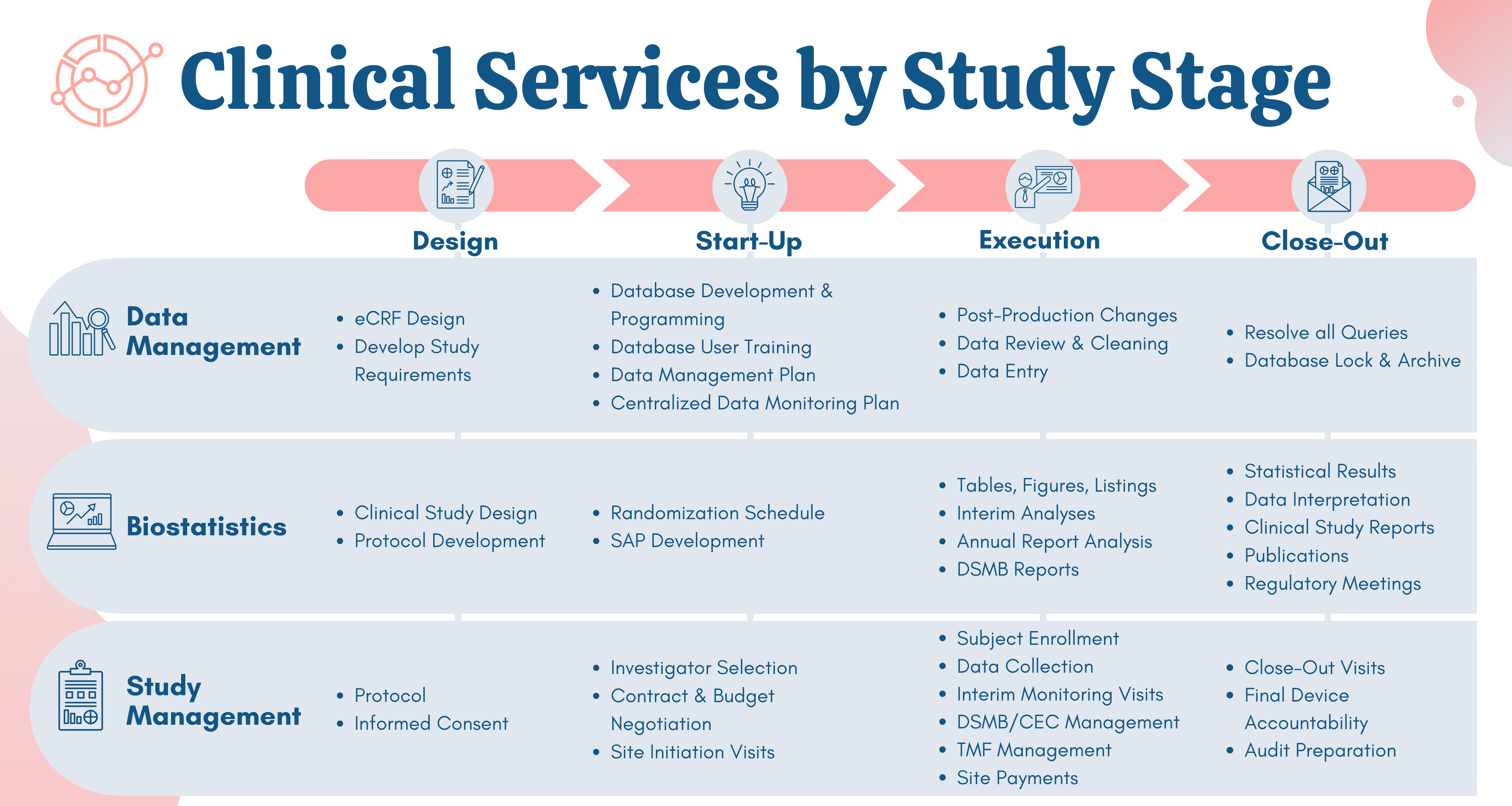
Evaluation of medical imaging devices often involves clinical studies where multiple readers MR read images of multiple cases MC for a clinical task which are often called MRMC studies. An adaptive design for a medical device clinical study is defined as a clinical study design that allows for prospectively planned modifications based on accumulating study data without. The Food and Drug Administration FDA has started encouraging the use of adaptive designs for clinical studies. This final guidance applies to premarket medical device submissions including premarket approval applications PMA premarket notification. Adaptive designs can be applied across all phases of clinical research from early-phase dose escalation to confirmatory trials. Medical Device Clinical Research Namsa.

The faster path to market. The US Food and Drug Administration FDA on Tuesday finalized guidance that lays out how to design medical device clinical trials that allow for changes based on data while maintaining study validity and integrity. Adaptive designs can be applied across all phases of clinical research from early-phase dose escalation to confirmatory trials. FDA Finalizes Guidance on Adaptive Designs for Device Studies. By spelling out when adaptive designs are acceptable in clinical trials for devices requiring Premarket Approval PMA or 510k premarket notification the FDA seeks to better inform both device manufacturers and its own. The Evolution Of Master Protocol Clinical Trial Designs A Systematic Literature Review Clinical Therapeutics.

The faster path to market. In particular we resize the study and adjust the critical value for hypothesis testing simultaneously after an interim analysis to achieve a target power and control the type I error rate in comparing AUCs of two modalities. Consequences and gains of possible trial adaptations need to be understood before initiation. In essence adaptive designs allow prospectively planned modifications to a clinical trial based on interim data provided scientific validity the ability to draw sound inferences and data integrity credibility and reproducibility are preserved. FDA Finalizes Guidance on Adaptive Designs for Device Studies. Pin Na Doske Interface Design.

It provides clarity on how to plan and implement adaptive designs for clinical studies used in medical device development. An adaptive design for a medical device clinical study is defined as a clinical study design that allows for prospectively planned modifications based on accumulating study data without. The pharmaceutical landscape is evolving as stakeholders pursue the use of real-world evidence precision medicine and complex innovative trial designs CID to increase efficiency of development. Integrating indacaterol dose selection in a clinical study in COPD using an adaptive seamless design. Pulm Pharmacol Ther 2010 23. New Clinical Trial Designs In The Era Of Precision Medicine An Overview Of Definitions Strengths Weaknesses And Current Use In Oncology Cancer Treatment Reviews.

Consequences and gains of possible trial adaptations need to be understood before initiation. The pace of the uptake of adaptive designs in clinical research however has remained well behind that of the statistical literature introducing new methods and highlighting their potential advantages. The pharmaceutical landscape is evolving as stakeholders pursue the use of real-world evidence precision medicine and complex innovative trial designs CID to increase efficiency of development. The US Food and Drug Administration FDA on Tuesday finalized guidance that lays out how to design medical device clinical trials that allow for changes based on data while maintaining study validity and integrity. Integrating indacaterol dose selection in a clinical study in COPD using an adaptive seamless design. What To Know Before Considering An Adaptive Design Clinical Trial.

Adaptive Designs for Medical Device Clinical Studies. The most frequently appearing type of adaptation was the seamless Phase IIIII design 81142 57 followed by adaptive group sequential 30142 21 biomarker adaptive 28142 20 adaptive dose-finding 23142 16 pick-the-winnerdrop-the-loser 13142 9 sample size re-estimation 11142 8 adaptive randomisation 10142 7 adaptive. There has been considerable interest among pharmaceutical and other medical product developers in adaptive clinical trials in which knowledge learned during the course of a trial affects ongoing conduct or analysis of the trial. Adaptive design for medical devices. Analytical results have been derived. Adaptive Design Clinical Trials Jli Blog.
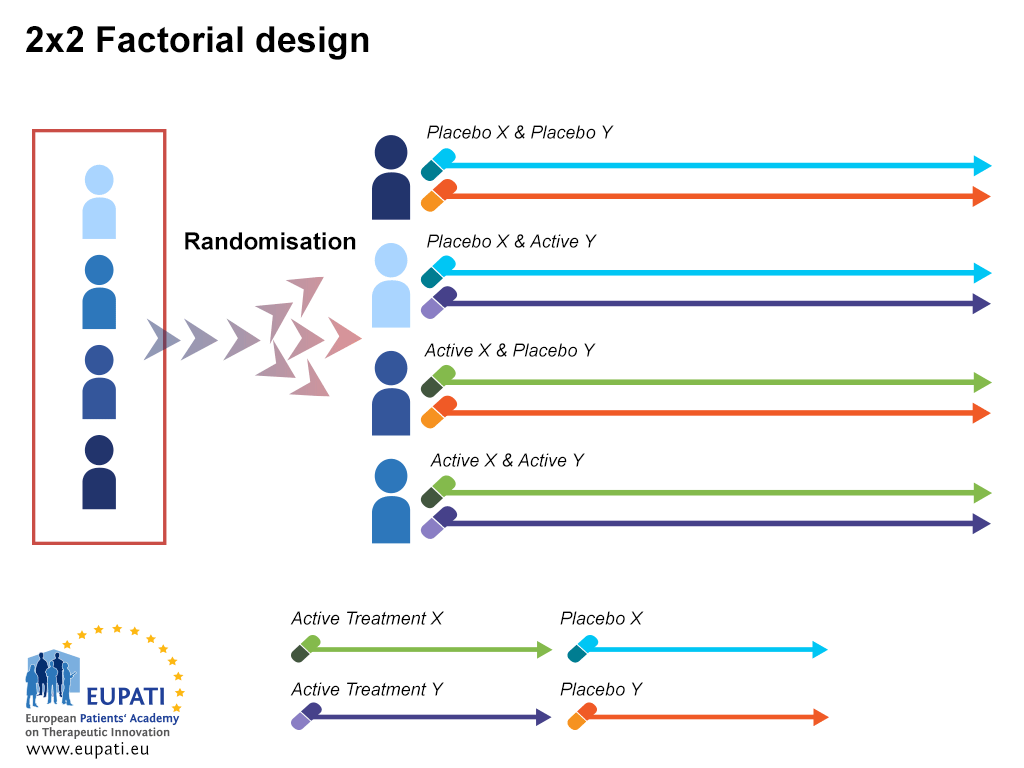
Following the release of the FDA draft Guidance document on adaptive. Adaptive design for medical devices. Adaptive Clinical Trial Design Case Studies. An adaptive design clinical trial can help to create a stronger value proposition for your medical device and give you a competitive edge by reducing development costs and accelerating time-to-market. The pharmaceutical landscape is evolving as stakeholders pursue the use of real-world evidence precision medicine and complex innovative trial designs CID to increase efficiency of development. Clinical Trial Designs Eupati Toolbox.
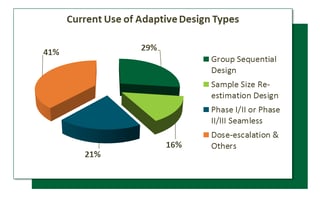
Guidance for Industry and Food and Drug Administration Staff. Adaptive design for drug and device studies. Integrating indacaterol dose selection in a clinical study in COPD using an adaptive seamless design. Pulm Pharmacol Ther 2010 23. An adaptive design clinical trial can help to create a stronger value proposition for your medical device and give you a competitive edge by reducing development costs and accelerating time-to-market. What Are The Major Common Types Of Adaptive Designs Used In Clinical Trials Today.
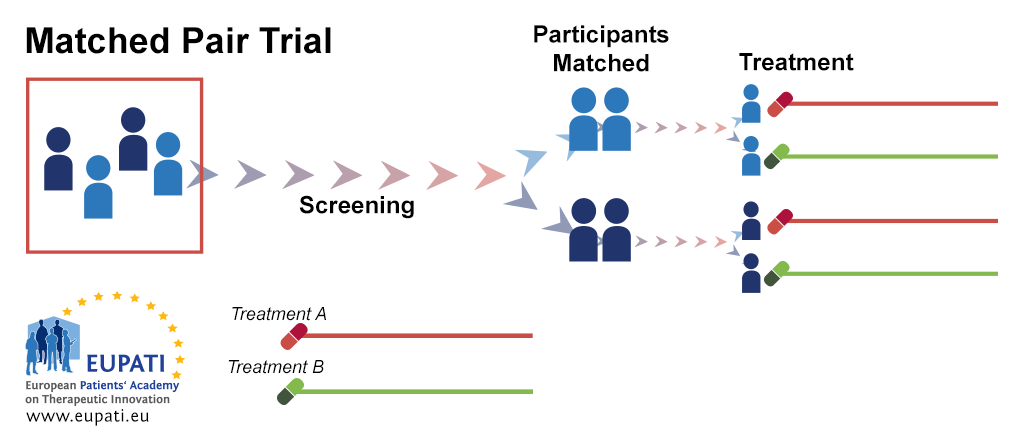
Consequences and gains of possible trial adaptations need to be understood before initiation. Integrating indacaterol dose selection in a clinical study in COPD using an adaptive seamless design. The pace of the uptake of adaptive designs in clinical research however has remained well behind that of the statistical literature introducing new methods and highlighting their potential advantages. An adaptive design clinical trial can help to create a stronger value proposition for your medical device and give you a competitive edge by reducing development costs and accelerating time-to-market. What is Adaptive Design Clinical Trial. Clinical Trial Designs Eupati Toolbox.
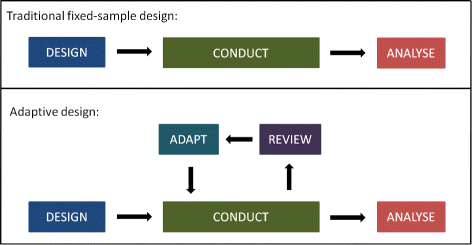
The pace of the uptake of adaptive designs in clinical research however has remained well behind that of the statistical literature introducing new methods and highlighting their potential advantages. Consequences and gains of possible trial adaptations need to be understood before initiation. The pace of the uptake of adaptive designs in clinical research however has remained well behind that of the statistical literature introducing new methods and highlighting their potential advantages. Adaptive designs can be applied across all phases of clinical research from early-phase dose escalation to confirmatory trials. What makes a randomised clinical trial adaptive. Adaptive Designs In Clinical Trials Why Use Them And How To Run And Report Them Bmc Medicine Full Text.

FDA says it received 151 comments from seven entities including. By spelling out when adaptive designs are acceptable in clinical trials for devices requiring Premarket Approval PMA or 510k premarket notification the FDA seeks to better inform both device manufacturers and its own. The most frequently appearing type of adaptation was the seamless Phase IIIII design 81142 57 followed by adaptive group sequential 30142 21 biomarker adaptive 28142 20 adaptive dose-finding 23142 16 pick-the-winnerdrop-the-loser 13142 9 sample size re-estimation 11142 8 adaptive randomisation 10142 7 adaptive. The US Food and Drug Administration FDA on Tuesday finalized guidance that lays out how to design medical device clinical trials that allow for changes based on data while maintaining study validity and integrity. It provides clarity on how to plan and implement adaptive designs for clinical studies used in medical device development. Summary Of Different Types Of Adaptive Designs For Clinical Trials Download Scientific Diagram.
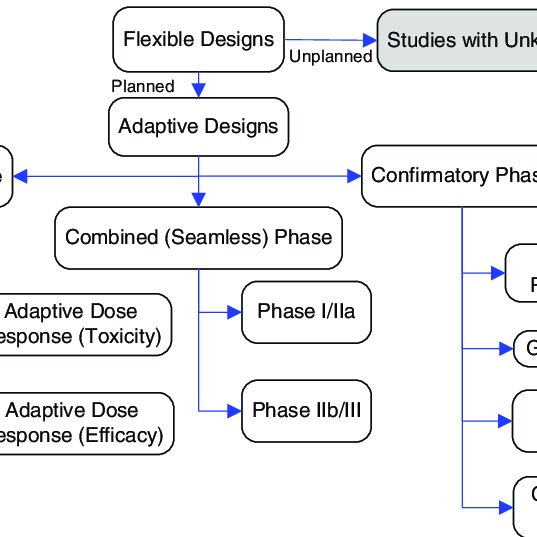
Adaptive Clinical Trial Design Case Studies. Evaluation of medical imaging devices often involves clinical studies where multiple readers MR read images of multiple cases MC for a clinical task which are often called MRMC studies. The faster path to market. An adaptive design is defined as a design that allows modifications to the trial andor statistical procedures of the trial after its initiation without undermining its validity and integrity. Bringing in voices from the industrys best clinical specialists strategists and statisticians SMis 9th Adaptive Designs in Clinical Trials conference will feature case. Summary Of Different Types Of Adaptive Designs For Clinical Trials Download Scientific Diagram.









